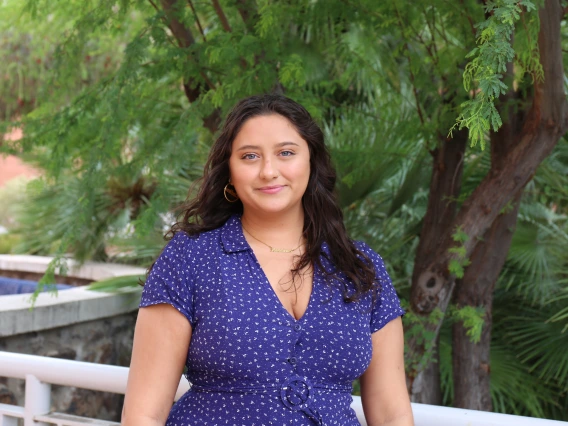
Having deep family roots in Germany and living there as a child, Alexandra Johnson knew she wanted to return and make her home there.
Now, with a Fulbright grant, Johnson is on her way, invited to spend a year as an English teaching assistant, part of the longstanding cultural exchange program.
A recent graduate with a double major in German Studies and Biological Anthropology, Johnson says her award through the Fulbright U.S. Student Program is the first step toward her larger personal and career goals.
“I’ve had a lot of experience in Germany and the German-speaking world. My motivations have always been that I wanted to be back in Germany. That’s where I feel most comfortable and most at home,” she said. “The Fulbright is a great opportunity to do that and for me to explore and further develop my skills.”
Johnson spent a few of her elementary school years in Bonn, and while at the University of Arizona, lived in Germany twice during study-abroad trips, first a summer in Leipzig and then a full year in Heidelberg. The Fulbright Commission assigned her to the German Bundesland (federal state) of Schleswig-Holstein, the northernmost state in Germany. She’ll find out later in the summer the precise town she will be assigned to.
“What attracted me to the German Studies major in general was my experience growing up in Germany. I have realized retroactively that I actually grew up with a lot of German-American culture, but it wasn’t until I moved to Germany at the age of 6 that I was able to learn the language. It was something that came very naturally to me, but I was unfortunately not able to continue formal education in the language after my family returned to the U.S. I always knew I wanted to have German Studies be my major in addition to a STEM major, so I could actually become fluent and not talk like a 6-year-old anymore,” she said.
Johnson declared her major right away, testing into upper-division German language classes and jumping fully into the program. She spent three years in the Deutscher Studenten Club, with one year as secretary and two as president. She also taught German at Sam Hughes Elementary School, was a tutor for University of Arizona German Department’s German language classes, was a research assistant for Dr. Obenewaa Oduro-Opuni transcribing German Fraktur and served as a College of Humanities Student Ambassador. In addition to her double major, with honors, Johnson earned a Teaching English as a Foreign Language certificate.
The Department of German Studies is small, but tight-knit and very active and Johnson said all of the faculty were supportive of her goals, including the Fulbright program, but Assistant Professor Joela Jacobs was especially influential.
“I feel fortunate to call her a professor, mentor, thesis advisor and friend who is always there for me,” she said.
Jacobs advised one of Johnson’s two honors theses, which examined how contemporary German music creates spaces of belonging for people with transcultural identities.
“Alexandra has been pursuing ways to expand her horizons and give back to others consistently since her first year at the University of Arizona,” Jacobs said. “Because she has a lot of intercultural expertise, I was particularly thrilled when she was selected for a one-year stay in Germany through the Federation of German-American Clubs. When she was placed in Heidelberg for her study abroad year, she immediately took to the city with great enthusiasm. As she kept in touch with me, I saw her thrive and excel in her courses at the Universität Heidelberg and feel at home in the community.”
Johnson wants to work at the intersection of women’s health, environment and culture, which combines her undergraduate majors. Germany has long been a hub for anthropology, and particularly evolutionary or biological anthropology and after the Fulbright, Johnson plans to apply to the medical anthropology master’s program in Heidelberg and subsequently the doctoral program at the Max Planck Institute for Evolutionary Anthropology in Leipzig.
“My German major has prepared me linguistically, being able to operate professionally in a German context, but also to further the intercultural competency skills that will help me when it comes to teaching English through the Fulbright program because cultural awareness is the most important thing,” she said. “I’ve been fortunate enough to be raised and educated to think about the world in a very international or global context.”
That perspective comes largely from her background as a child of immigrants and growing up trilingual in English, Spanish and German. Her mother’s family came to what is now the United States and Canada from Germany generations ago, while her father’s family immigrated to Chicago from Honduras in the 1960s.
“It’s always been clear to me that I belong to multiple cultures. I feel an extreme amount of pride about that, because it is simply who I am. It seems natural to me that I belong to multiple places, not just Arizona where I was born. My friends and family are from all over the world,” she said. “Being at the university has definitely helped validate those feelings. So many people are global citizens and are internationally focused and I realized it’s possible to do that.
“It also validated and reiterated to me that interconnectedness and interculturality are valuable professionally and personally. It was weird when I moved back to the States when I was 8 and I had to put myself in a box. Being multiracial and coming from very different cultures, it was confusing. As a child, I felt like I had to pick and choose and that my multikulti-ness just exacerbated the othering I experienced growing up. Now I’m thankful for all of my identities and the opportunities my hard work has afforded me as a result."

